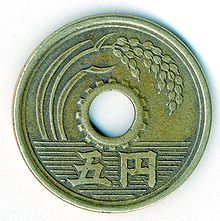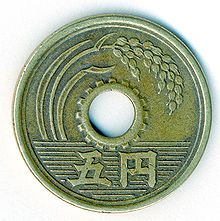It is because of Japanese culture, not the monetary value.

The Japanese for “five yen,” go en (五円) is a homophone with go-en (御縁), “en” being a word for causal connection or relationship, and “go” being a respectful prefix. As a result, five-yen coins are commonly given as donations at Shinto shrines with the intention of establishing a good connection with the deity of the shrine, and is widely believed it is best to insert a single five-yen coin into a new wallet before inserting any other money.
The reason why the five yen coin is lucky is because it’s called a “go-EN” coin. The number 5 is “go” in Japanese, and “yen” is pronounced more like “en.”
To be precise, “go-EN” means “honorably good luck” especially in terms of relationships. So people throw in these coins at a temple hoping to meet new people who might bring fortune, business, friendship or love.
Source: Tokiotours

